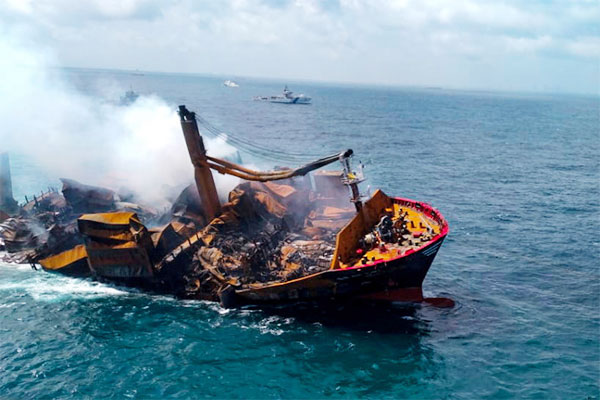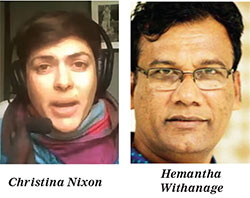News
Environmental Investigation Agency, UK and CEJ, Sri Lanka jointly lobby IMO over its inaction after X-Press Pearl disaster

By Ifham Nizam
Environmental Investigation Agency (EIA), UK in partnership with the Centre for Environmental Justice – CEJ, Sri Lanka backs the Sri Lankan outline of a myriad of ways the International Maritime Organization (IMO) is failing to look after the environment by putting the interests of the shipping industry first.
The Marine Environmental Protection Authority (MEPA) and environmental NGOs yesterday demanded that IMO provide a new classification of hazardous substances after devastating X-Press Pearl plastic pellet spill nine miles off the Sri Lankan coast. On 25th May 2021 the Singapore-flagged cargo ship X-Press Pearl spilled 1,680 tonnes of plastic pellets, 9,700 tonnes of other plastics and toxic pollutants. With plastic accumulating on beaches up to a height of two metres, it marked the worst marine environmental disaster in the country’s history, and the single largest plastic pellet pollution event the world has ever seen.
 The event follows similar incidents in Hong Kong (2012), South Africa (2017 and 2020) and in the North Sea (2019, 2020).
The event follows similar incidents in Hong Kong (2012), South Africa (2017 and 2020) and in the North Sea (2019, 2020).
EIA, on behalf of the NGOs in the Clean Shipping Coalition, will be putting pressure on the International Maritime Organization (IMO) at their November meeting, demanding more than the few minutes allotted to acknowledge the gravity of the X-Press Pearl disaster, debate the classification of plastic pellets and outlining the lack of action taken to date on plastics.
Christina Dixon, Deputy Ocean Campaign Leader of the Environmental Investigation Agency (EIA) yesterday said:
“Although plastics from sea-based sources account for roughly 20% of plastic pollution, the pace of action to prevent plastic pollution from ships at the international level is sorely lacking.
“The recent tragedy of the X-Press Pearl in Sri Lanka is a devastating example of the impact of a lack of oversight and preventative measures. With fishing communities and marine habitats now devastated by billions of plastic pellets polluting their environment, it is the local communities left bearing the brunt of the clean-up and harm.”
IMO recognizes plastic waste in our ocean as their responsibility but is failing to live by their words. Despite the need for urgent action to protect marine ecosystems, livelihoods and coastlines the issue is slipping through the net.
“We expect to be given just a couple of minutes at the meeting to cover what has been the worst plastic pellet spill in history. The IMO principally looks after the interests of the shipping industry, but it cannot continue to do so without protecting our marine environment in parallel. It is of paramount importance they move immediately to reclassify plastic pellets as a hazardous substance on the request of Sri Lanka; a country who through zero fault of their own, will be struggling in the wake of this disaster for years to come.”
Executive Director of the Centre for Environmental Justice Hemantha Withanage said: “Immediately after the X-Press Pearl ship accident, more than 20,000 fishermen were disallowed from fishing in the area and have lost access to their livelihood up to now. Many fish and other marine animals including 417 turtles, 46 Dolphins and 8 whales were found dead. Some of them had mistakenly eaten micro plastics as food. Most of these plastic nurdles will remain in the ocean environment for the next 500 years or more. Ship owners and the insurance company P&I club must take full responsibility for the damage caused. Furthermore, it’s time to regulate unsafe transportation of large quantities of plastic nurdles.”
News
Japan-funded anti-corruption project launched again

‘NPP taking credit for what was started during previous govt.’
The National Anti-Corruption Action Plan (NACAP) 2025-2029, ceremonially launched by President Anura Kumara Dissanayake on 09 April, 2025, had actually got underway during former President Ranil Wickremesinghe’s tenure, sources said.
According to a joint media release issued by the interested parties, following the launch, also attended by Chief Justice Murdu Fernando, PC, the Commission to Investigate Allegations of Bribery and Corruption (CIABOC)-led project received the financial backing of Japan and the technical expertise of the UNDP.
In response to The Island query regarding the recipients of the funding, exact amounts provided to them and the duration of the project, sources said that the 18-month-long project, implemented by the UNDP, had been launched in March 2024. According to sources, the project was launched with Yen 137 mn made available through the Japanese Supplementary Budget (approximately 931,000 USD) six months before the last presidential election.
New Japanese Ambassador in Colombo Akio Isomata, and UNDP Resident Representative Ms. Azusa Kubota, were among those present at the 09 April launch.
Isomata’s predecessor Mizukoshi Hideaki finalised the agreement with Ms Kubota on 12 February, 2024, to pave the way for the new project, titled ‘The Project for Promoting Economic Governance through Anti-corruption Policy Support.’
Assistance from Japan and UNDP was in line with their efforts to enable Sri Lanka struggling to resolve the economic crisis.
The Japanese Embassy said on 12 February, 2024, that the project sought to (1) strengthen legal and policy frameworks; (2) improve coordination among key institutions combating financial and tax crimes; and (3) enhance strategic institutional and individual skills and capacities around combating anti-corruption through strategic action.
By Shamindra Ferdinando
News
Ranil makes statement to CIABOC

Former President Ranil Wickremesinghe leaving the Commission to Investigate Allegations of Bribery or Corruption (CIABOC) yesterday after making a statement related to ongoing investigation into former State Minister Chamara Sampath Dassanayake. Dassanayake is in remand custody pending investigations into an alleged misappropriation of funds during his tenure as the Uva Province Chief Minister.
(Pic by Nishan S. Priyantha)
News
Nearly 500 kilos of heroin destroyed under court supervision

The police and court officials yesterday (28) supervised the destruction of nearly 500 kilos of heroin at the INSEE Cement Plant located in Puttalam.
The following is the text of statement issued by the INSEE Ecocycle Lanka (Private) Limited in this regard: ” Building on a consistent track record of supporting national anti-narcotics initiatives and eradicating a national menace, INSEE Ecocycle Lanka (Private) Limited, the leading professional waste management solutions provider, collaborated once more with the Sri Lanka Police Narcotics Bureau (PNB) and the National Dangerous Drugs Control Board (NDDCB) to responsibly dispose of 494.048 kgs of confiscated heroin via co-processing technology.
This marks the fourth collaboration between INSEE Ecocycle and law enforcement authorities for the destruction of such substances, following successful disposals carried out in 2018, 2019, and 2023 totalling approximately 1804 kgs of dangerous drugs.
The disposal, which ensured environmentally safe and secure destruction of the narcotics, was conducted on 28 April at the INSEE Cement Plant located in Puttalam, under the strict supervision of PNB officials and court-appointed representatives.
Prior to disposal, the confiscated heroin, seized during national anti-narcotics operations, was rigorously verified by the Government Analyst Department (GAD), NDDCB, and judicial authorities to ensure compliance with legal and safety protocols.
INSEE Cement Sri Lanka Chairman/CEO Nandana Ekanayake explained: “INSEE Cement is the only fully integrated cement manufacturing facility in the country with the required capability to provide this solution. We proudly support the national cause and contribute to building a drug-free nation. Sri Lanka’s only operational Cement Kiln Co-processing facility is in our Puttalam Cement Plant. INSEE Cement has always focused on the Health and Safety of all our stakeholders. As a responsible corporate citizen, we are proud and honoured to extend our support and ensure the safe disposal of harmful substances with utmost care and professionalism.”
Emphasizing the significance of the initiative, Sujith Gunawardena, Director, INSEE Ecocycle, said, “As Sri Lanka’s sole provider of co-processing technology, we are proud to collaborate with the authorities and support this critical effort. We successfully disposed of the confiscated narcotics in an environmentally friendly and sustainable manner, complying with all the regulations. Co-processing offers a complete destruction solution for hazardous waste at extremely high temperatures, eliminating it without harmful emissions or residual byproducts. It is a cleaner and more sustainable solution than traditional incineration. It is globally accepted as the superior waste management method, significantly reducing greenhouse gas emissions and aligning with global best practices for sustainable waste management.”
INSEE Ecocycle played a critical role in the technical evaluation of the feeding mechanism and pre-processing activities, collaborating closely with PNB and NDDCB to guarantee the safe disposal of the hazardous substance. The comprehensive technical evaluation comprised thorough risk assessments and mitigation action plans, addressing environmental, social, health, and safety concerns for the entire pre-processing and co-processing value chain.
Throughout the confiscated heroin disposal process, experts from PNB and NDDCB provided guidance on critical components, including laboratory analyses and procedural adherence, culminating in the secure and transparent destruction of the narcotic substance. The disposal took place using cement kiln co-processing technology, also known as thermal destruction, at temperatures of 1800- 2000 °C with a 4-6 sec residence time and under fully controlled process parameters.
INSEE’s co-processing facility satisfies all regulatory requirements and technical standards and is globally adopted for waste management. The facility offers a complete solution with zero harmful emissions to the environment. It has also obtained all required licenses, such as the Environmental Protection License and Scheduled Waste Management License from the Central Environmental Authority and the Provincial Environmental Authority, and certifications including ISO 9001, ISO 14001, ISO 17025, ISO 39001, and ISO 45001.
With a proud legacy of over two decades, INSEE Ecocycle has managed more than 1.3 million metric tons of industrial waste in collaboration with over 1,000 customers, including multinationals, local conglomerates, corporations, government authorities at central and regional levels, and recycling partners. The partnership demonstrates the company’s commitment to advancing Sri Lanka’s circular economy and environmental stewardship.”
-

 News7 days ago
News7 days agoOrders under the provisions of the Prevention of Corruptions Act No. 9 of 2023 for concurrence of parliament
-

 Business2 days ago
Business2 days agoPick My Pet wins Best Pet Boarding and Grooming Facilitator award
-

 News6 days ago
News6 days agoProf. Rambukwella passes away
-

 News2 days ago
News2 days agoNew Lankan HC to Australia assumes duties
-

 Features2 days ago
Features2 days agoKing Donald and the executive presidency
-

 Business2 days ago
Business2 days agoACHE Honoured as best institute for American-standard education
-

 Features4 days ago
Features4 days agoThe Truth will set us free – I
-

 Features6 days ago
Features6 days agoThe sea-change after Modi’s visit












